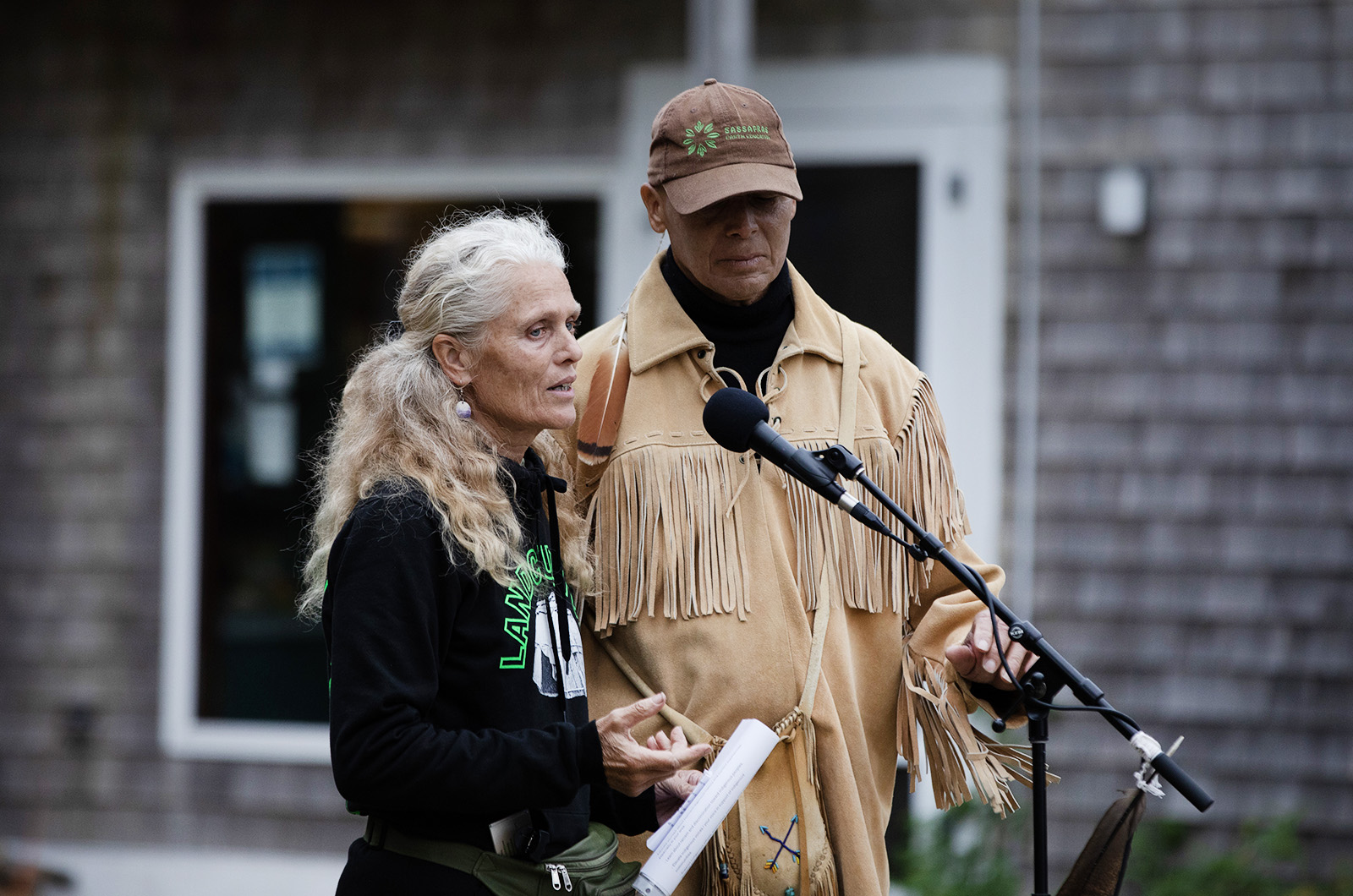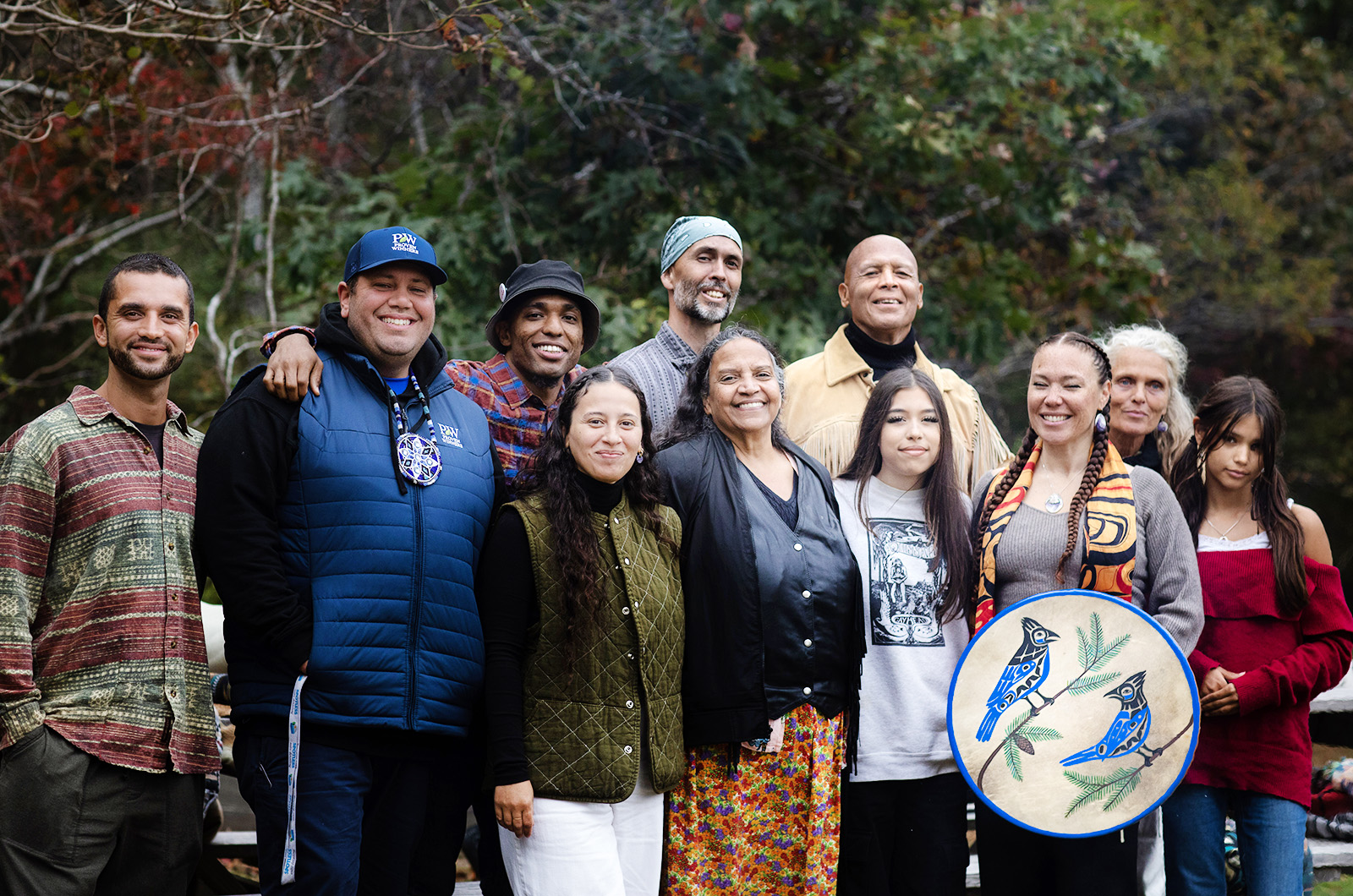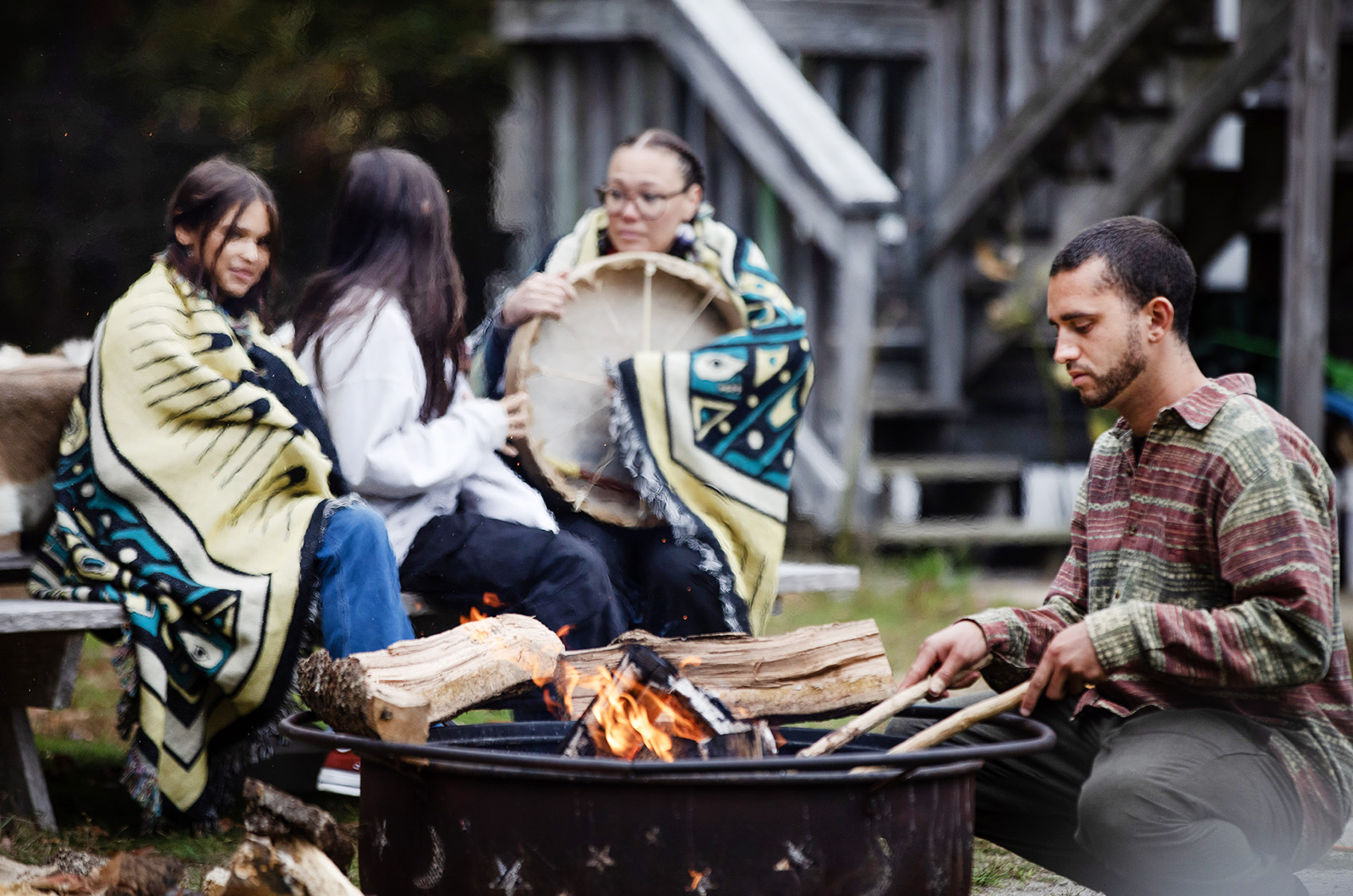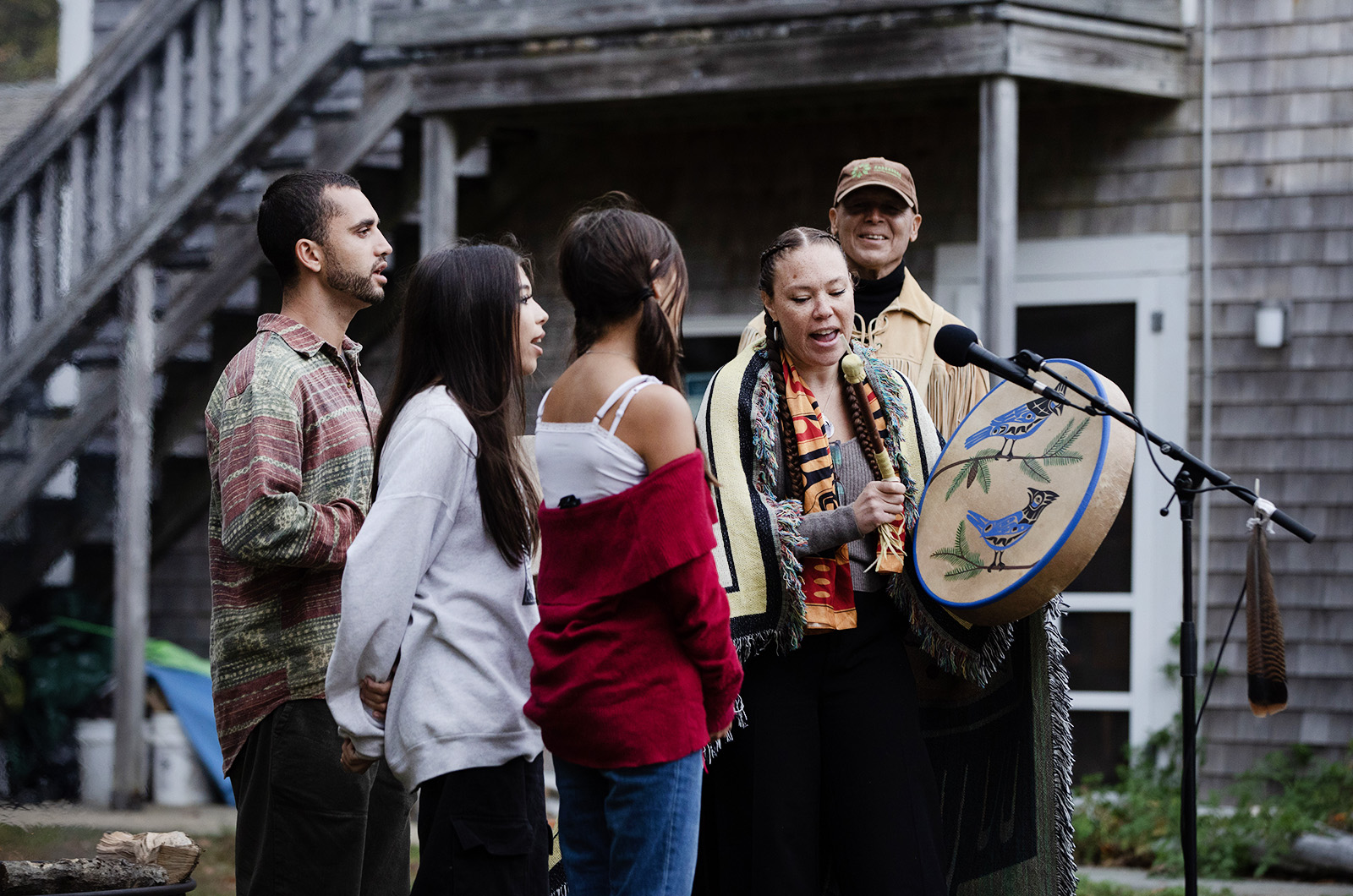The heartbeat of the Wampanoag Tribe of Gay Head (Aquinnah) rang out through a performance of the Black Brook Singers at Felix Neck Wildlife Sanctuary on Sunday.
The group, referred to as the tribe’s community drum, played a selection of songs as part of Indigenous Peoples Day commemorations. The event was hosted by Sassafras Earth Education, an Island organization focused on educating about and restoring Indigenous ways of life.
David Two Arrows Vanderhoop, co-founder of Sassafras Earth Education opened the event with remarks in Wôpanâak, followed by English. He highlighted several Wampanoag villages that existed across the Island, including Tchepiaquidenet (Chappaquiddick), Taakemmy (West Tisbury), Nashawahkamuk (Chilmark) and Aquinnah to emphasize the complicated culture and communication that existed on Noepe, the Wôpanâak name for the Vineyard.
He also acknowledged a large number of Wampanoag tribes on the mainland, from western Massachusetts to Narragansett, R.I.
“We had all of that culture,” Mr. Vanderhoop said. “I want to acknowledge that today we have bits and pieces of that, that we put together, that still hold us strong to the land....I want to acknowledge all of the Indigenous people of Turtle Island, the 100 million strong before this 500-year period when terrorists came.”
Throughout Mr. Vanderhoop’s remarks, he highlighted the history of colonization in North America, present day racism on the Island and across the country and the resilience of Indigenous peoples.
Alexis Moreis also spoke about the history of colonization on the Island, and the rights of the Wampanoag Tribe of Gay Head (Aquinnah).
“Wampanoag people have sustenance rights. Wampanoags can fish, they can harvest, they can hunt, they can access their waterways, their lands, to sustain their families,” Ms. Moreis said. “It sounds nice, but even that is something that’s constantly threatened. That’s threatened when you have homeowners that want to land grab.”
Ms. Moreis asked the audience to support efforts to make land and housing more accessible to the Wampanoag people.
“If you aren’t Wampanoag, you are a guest on this land, and that can be something that you’re proud of, and that can look differently than just living here and enjoying the land,” she said.
Ms. Moreis urged audience members who have multiple properties to return land to a Wampanoag family to allow them to live on the Island.
“I want to stop hearing that housing is only for employees. I want to stop hearing that the only value to Wampanoag living here is their job that benefits colonial settlers and an economy that does not benefit the Wampanoag community.”
In addition to history, the event highlighted Indigenous artistic talent. Durwood Vanderhoop, a member of the Black Brook Singers, talked about the importance of the group and the community drum.
“The drum is something that has come back to us. For quite a few generations, there was not a drum in Aquinnah,” Mr. Vanderhoop said.
He credited members of the tribe who would go to powwows, see other groups with a community drum, and were then isnpired to revitalize the tradition on the Island.
“When I was growing up, they decided that they want to help bring that back.”
The Black Brook Singers’ drum is a powwow-style drum, native to the plains tribes, Mr. Vanderhoop explained. He said the group performs a large variety of songs, including powwow songs and pieces handed down to them by other tribes. He added that there are younger members of the Wampanoag Tribe of Gay Head (Aquinnah) who are creating songs that the group performs.
“It is important to recognize [our culture] is always growing and changing as time goes by. Our people go to different places, we learned all kinds of different things,” Mr. Vanderhoop said. “We grow and we change as people and pick up new ideas. The thing that makes us Wampanoag people is our connection to the lands.”
Tiffany Vanderhoop, accompanied by her two daughters, performed three songs after speaking to the crowd. She highlighted the brutality that settlers such as Columbus wrought against Indigenous people.
“Since I was a young child, I knew there was something very wrong with how our country was running things, celebrating murderous psychopaths such as Columbus, who, in his own words, documented his deranged brutality and disregard for the beautiful Taíno people,” Ms. Vanderhoop said, referring to the Indigenous people of the Caribbean who Columbus encountered in the 1490s. “Today, I want to honor those beautiful people, the Taíno, and their grace and dignity in the face of pure evil.”
Carole Vandal shared some of her own story before playing a piece on the Native American flute. Ms. Vandal echoed the comments of Ms. Moreis, reiterating the need for land access. She also stressed the importance of education, highlighting the work of the Aquinnah Cultural Center’s museum, which is open in the summer and focuses on Aquinnah Wampanoag history.
“We could be open year-round, at least doing things for schools to come and learn, but we don’t have those resources,” Ms. Vandal said. “We don’t have the land, we don’t have the infrastructure, we don’t have a way to share our stuff, other than here on stolen land.”
Taj Madison, an Aquinnah Wampanoag who lives in Boston, delivered a poem called As Vast as Grandfather’s Sky, which he wrote as an ode to Sassafras Earth Education and the work the organization does.
“It’s been healing,” Mr. Madison said of returning to the Island and working with Sassafras. “When I come back, my spirit is so strong.”
The event ended with a call to the larger Island community to educate themselves and be better allies with the Wampanoag Tribe of Gay Head (Aquinnah) and Indigenous people across the world.
Saskia Vanderhoop, a co-founder of Sassafras Earth Education, asked the audience to reflect on what they learned and to support Indigenous-owned businesses and initiatives.
NaDaizja Bolling, the director of the Aquinnah Cultural Center, echoed those sentiments.
“It’s really important that the Island community come out and hear truth from the Wampanoag community and learn how to be better neighbors,” Ms. Bolling said.











Comments (2)
Comments
Comment policy »